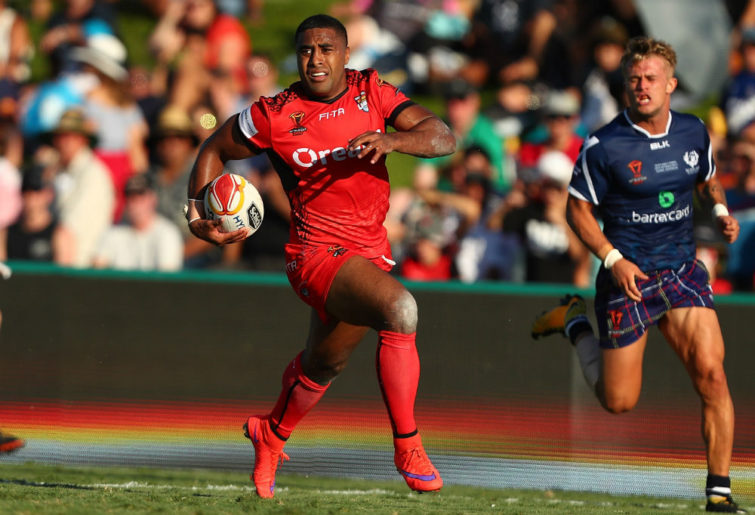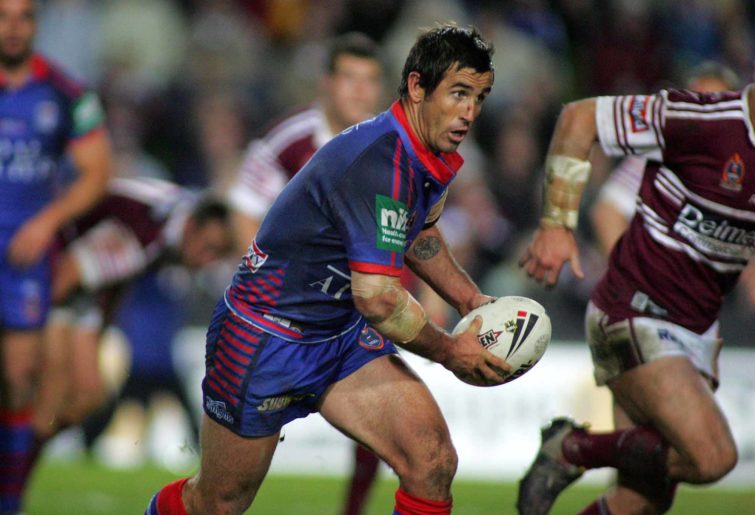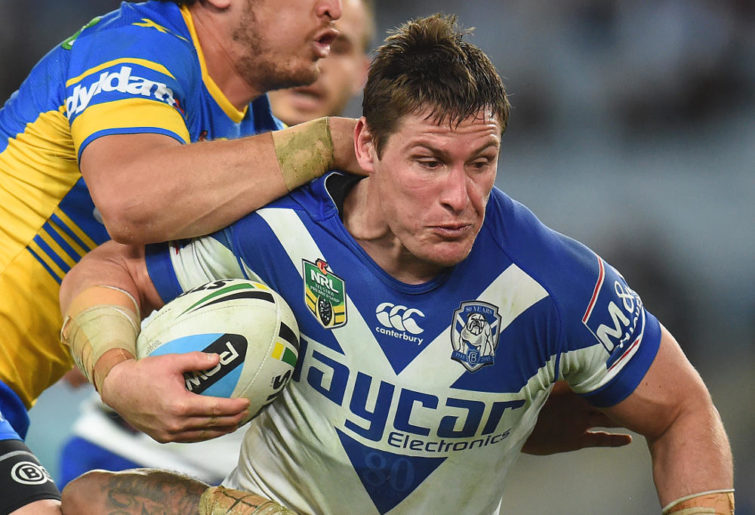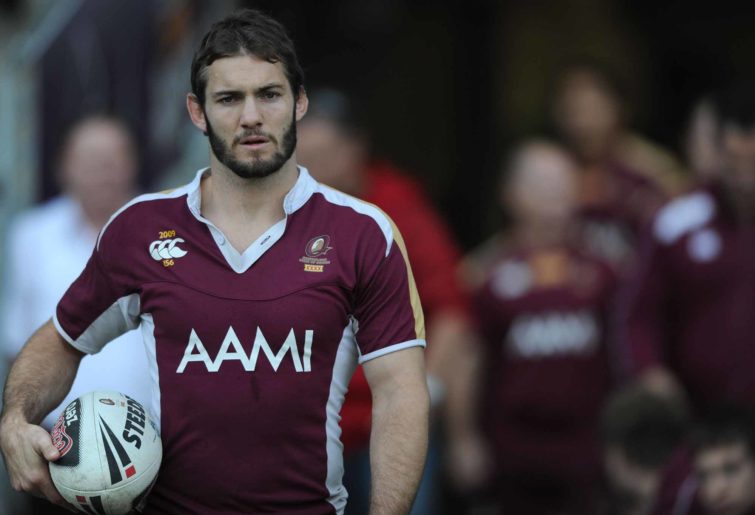Continuing my series of great alphabet teams, we head on to the J team.
Halfbacks everywhere but only one spot available, and three Golden Boot winners on the bench!
1. Les Johns
Honours: ARL Hall of Fame, NSWRL player of the year 1968, Fullback for the NSWRL Team of the 60’s. Bulldogs 70 Year Team of Champions. Newcastle Team of the Century.
Years active: 1961–1971
Clubs: Newcastle, Canterbury
All games: 204 (32 tries, 1,157 points)
Representative Career: Tests: 14, NSW: 16.
Nickname: “Golden Boy” “Dandruff”.
It’s with a heavy heart that I leave out the great Gary Jack, but he misses out to Les Johns.
Between Churchill, Langlands and Eadie, there was Les Johns. He only played 103 matches for the Bulldogs over nine seasons blighted by injury but, during that time, the Golden Boy established himself as one of the all-time great fullbacks, a dynamic attacker with great kicking skills, and amazing speed which allowed him to mow down attackers from behind.
Johns first represented NSW Country from Newcastle in 1961. In 1962 he played fullback as Newcastle beat the touring Great Britain team and was selected for NSW. He joined Canterbury in 1963 and was picked for Australia that year touring with the 1963-64 Kangaroos.
Johns was one of many great fullbacks of his era – Keith Barnes, Ken Thornett, Graeme Langlands and Eric Simms – and Test jerseys were shared around, but Johns played at least one Test every year between 1963 and 1969, including all six Tests on the 1967-68 Kangaroo Tour (pushing Graeme Langlands to the centres).
In 1966 in the third and deciding Ashes Test Johns managed to give away a penalty try, throw an intercept pass, but still have a hand in three tries for Australia as they won the test.
Johns played in Canterbury’s grand final team of 1967 and was named at fullback in the club’s 70-year Team of Champions.
Johns was also a decent cricketer playing as a batsman in first grade for over 20 years. He scored back to back centuries in his final season first-grade cricket in 1986, at 43 years old.
Peter “Bullfrog” Moore: “Johns could almost pull off the impossible, and always did the unpredictable.”
2. Brian Johnston
Years active: 1978–1989
Clubs: Dunedoo, St George
Club games: 167 (St George) (61 tries)
Representative Career: Tests: 1, NSW: 9.
I really, really wanted to put Gary Jack here, but he didn’t play even a single first-grade game on the wing, so the spot goes to the St George centre, winger and club chairman, Brian Johnston. While he was more of a centre, his speed saw him often selected on the wing.
Before negotiating ownership deals with media companies, Johnston came from Dunedoo to St George in 1980. He had already made an impression, playing for NSW Country since 1978.
Johnston first played for NSW in 1981 and represented on and off right up until his retirement, playing all four games in 1987 (including the US exhibition match). His greatest moment was selection on the bench for the 1987 Australian team against NZ. Unfortunately, the game was lost and Johnston was not picked again.
Johnston was a regular at centre or wing for the Dragons right through the 1980s, but was injured or not selected for their grand finals appearances.
3. Michael Jennings
Years active: 2007-
Clubs: Penrith, Sydney Roosters, Parramatta
Club games (to 2018) 260 (140 tries)
Representative Career: Tests: nine (plus seven for Tonga), NSW: 18.
Nickname: “Jenko”.
Michael Jennings had a rocky 2018, but there is no denying his career achievements. He burst on the scene in 2007 and won the RLPA Rookie of the Year. By 2009 he was selected for NSW and Australia.
Jennings’ time for NSW between 2009 and 2016 saw more heartache than success, but he was a member of the 2014 team that broke the state’s series drought. This led to Jennings being selected in all matches in the 2014 Four Nations Tournament, including the final won by New Zealand over the Australians.
He had earlier represented Australia from time to time, with a highlight being a hat-trick on debut against France.
Jennings also played for Tonga in the 2008 and 2017 World Cups, providing much-needed experience and try-scoring prowess.

Michael Jennings playing for Tonga. (Photo by Chris Hyde/Getty Images)
At club level, Jennings has been a prolific try scorer, with 140 to date. After a successful time at Penrith, he left in 2012 and enjoyed his most prolific period at the Sydney Roosters.
In 2013 Jennings scored 20 tries for the club, including two in the preliminary final and another in the club’s grand final victory. Jennings then scored a hat-trick in their 2014 World Club Challenge victory over Wigan. He was an integral member of the club as they achieved three minor premierships in succession.
In 2018, his time at Parramatta was not so successful, culminating in a stint in the Intrust Super Cup.
Oddly for such a dynamic player, in the 2011 season, Jennings only scored one try.
Tim Mannah: “When you see him in space, he just looks different to a lot of other people. He looks like a fast car about to take off.”
4. Peter Jackson
Years active: 1981–1993
Clubs: Souths Brisbane (QLD), Canberra, Leeds (UK), Brisbane, North Sydney
Club games: 103 (Sydney) (23 tries, six goals, four field goals)
Representative Career: Tests: 9, QLD: 17.
Nickname: “Jacko”.
Peter Jackson is remembered as one of rugby league’s great characters and also a tragic victim of child abuse and depression. But Jacko was also an extremely skilful and talented centre, who was at the heart of successful periods for Brisbane Souths, Canberra and Queensland.
After representing Australian Schoolboys at both league and union, Jackson started his senior career under Wayne Bennett at Souths in Brisbane alongside other stars such as Mal Meninga, Gary Belcher and Bob Lindner. In 1984 and 1985 the side won one grand final from two appearances against the Wally Lewis led Wynnum-Manly.
He was first picked for State of Origin in 1986, before following Bennett, Meninga and Belcher to Canberra in 1987. There, Jackson played two seasons, including the 1997 grand final loss to Manly. However, he left the club before their successful period from 1989. Jackson went on to spend two years at the Broncos, before finishing his career with Norths.
Jackson was a key figure at Origin level. In between his debut in 1986 and his last series in 1992, Jackson played in five winning series out of seven. A highlight was a surprise change to five-eighth in Game 1 of 1988 to replace an injured Wally Lewis (the first ever Origin match without Lewis) and he led the Maroons to victory.
Each year, The Peter Jackson Memorial Trophy is awarded to the person who makes the most significant contribution to the Queensland Origin campaign.
Jackson represented Australia at centre or five-eighth nine times between 1988 and 1992, including all three games in the 1988 Ashes, where he scored two tries on debut in the first Test victory.
He was also a classic commentator. He once referred to Gary Belcher “as safe as a condom at the back”, sending fellow commentator Warren Boland into a laughing fit.
But, unfortunately, there was much more below the surface. Wayne Bennett put it this way: “He was so gifted, so much ability and … then the devil would come along.”
5. Chris Johns
Honours: Brisbane Broncos Hall of Fame
Years active: 1984–1996
Clubs: St George, Castleford (UK), Brisbane, Barrow (UK)
Club games: 245 (excludes Barrow) (64 tries)
Representative Career: Tests: 9, NSW: 10.
We are short on wingers. Johns was primarily a centre, but he played six times on the wing for NSW and also 27 club matches.
Chris Johns was a solid attacking and defensive centre who forged a solid career with St George in the 1980s (including coming off the bench in the 1985 grand final) and then was one of the few New South Welshmen to be part of the inaugural Brisbane Broncos squad in 1988.
Although Johns was born in Queensland, he was raised in St George in Sydney. Johns represented NSW and Australia from Brisbane and played in the club’s 1992 and 1993 premiership victories. He was part of an all-star backline in those years of Julian O’Neill, Michael Hancock, Steve Renouf, Chris Johns, Willie Carne, Kevin Walters and Alan Langer and he scored a try in the 1993 decider.
He also was part of the Broncos team that won the 1992 World Club Challenge against Wigan, the first Australian team to do so in England.
After topping the Broncos try scoring list in 1989, Johns represented both NSW and Australia. He went on to play nine matches for each between 1989 and 1994, usually on the wing or from the bench and was a member of the 1990 Kangaroo Tour.
6. Albert ‘Ricketty’ Johnston
Years active: 1912–1922
Clubs: Balmain, Western Suburbs, Newtown, St George
Club games: 109 (9 tries)
Representative Career: Tests: 8, NSW: 10.
Nickname: “Ricketty”.
This could so easily have gone another way. Matthew Johns’ combination with his brother nearly got him over the line. The temptation to fit the great Stacey Jones or the nearly great Shaun Johnson into the team by playing them out of position was also very great. But, in the end, I’ll stick with a true five-eighth and select Albert ‘Ricketty’ Johnston.
Johnston was initially a halfback, but when Arthur ‘Pony’ Hollaway joined the Tigers in 1915, Johnson moved to five-eighth. This combination anchored the great Balmain team of the war years.
Johnston playing in each of the club’s three back to back premierships from 1915 to 1917. In 1915, the Watersiders were the first team to go through a season undefeated, and Johnston played in every match.
Ricketty played a year for Wests and also in Brisbane, where Wests Brisbane were stripped of competition points for playing Johnston when ineligible. The club forfeited the rest of the 1918 in protest.
He then became captain-coach of Newtown in 1919 and 1920. When St George joined the competition in 1921, residential rules at the time meant Johnston was required to play for them.
Johnston’s representative appearances were hampered by the War. After debuting for NSW in 1913, he did not represent again until 1919, when he was in the second half of his career. He still played all Tests in winning series against New Zealand in 1919 (scoring a try on debut) and against Great Britain in 1920 (Australia’s first series win against the British on home soil).
Johnston captained Australia for a Test against each opposition and won both.
In the second Test against New Zealand in 1919, Johnston switched to halfback and captain after Arthur Halloway was injured. Johnston inspired his team to victory despite being behind 23-18 midway through the second half and with another player sent off.
Johnston remained as captain for the final Test and, partnered by Duncan Thompson, the Kangaroos won 32-2. He finished by touring with the 1921-22 Kangaroos, appearing in one more Test.
7. Andrew Johns (Captain, goalkicker)
Honours: Rugby League Immortal. ARL Team of the Century. ARL Hall of Fame. NSWRL Team of the Century. Golden Boot 1999 and 2001. Dally M Medal 1998, 1999 and 2002. Dally M Halfback of the Year 1995, 1998, 1999 and 2002. Clive Churchill Medal 2001. Sport Australia Hall of Fame. NSW Sports Hall of Fame.
Years active: 1993–2007
Clubs: Newcastle, Warrington (UK)
All games: 307 (101 tries, 2,571 points)
Representative Career: Tests: 24, NSW: 23.
Nickname: “Joey”. Roy and HG nicknames: “The Unmade Bed”, “One Bung Lung”.
Apologies to Stacey Jones, maybe New Zealand’s greatest player, but there is only one Andrew Johns.
Johns revolutionised the sport, particularly with his attacking kicking game. He was also a brilliant passer of the ball, had the ability to make breaks on his own and was maybe the hardest hitting halfback of all time.
Add to that a football brain and vision not seen since Wally Lewis and his prolific goal kicking and Johns was the complete package, able to win games on his own and turn ordinary teams and players into champions.

Andrew Johns. Legend. (AAP Image/Action Photographics/Grant Trouville)
Right from the moment Johns scored 23 points and was named man of the match on his club debut, he was something special. Johns won two grand finals with the Knights (the only two the club has ever won), famously setting up the match-winning try with a blindside play in the final seconds in 1997 (while playing with a punctured lung and fractured ribs) and being named man of the match as captain in 2001. He finished his career as the competition’s leading all-time points scorer.
He was first selected for NSW and Australia in 1995 and, although he often played hooker in his early years to accommodate Brett Kimmorley and Geoff Toovey (Johns played ten of his 24 Tests at hooker), Johns still pretty much ran the show. He was named man of the match in the 1995 World Cup finals as the Australian team, minus super league aligned players, won the title and was also named man of the series.
Johns was named captain of Australia in 2002 and produced a man of the series performance against Great Britain. He captained NSW to an Origin series victory in 2003. As a final bow, Johns returned to State of Origin in 2005 after the Blues had lost the first game and simply tore QLD apart, turning the series on its head.
Phil Gould: “The greatest rugby league player of his generation; and arguably the greatest of all time.”
There is only one Andrew Johns.
8. Pat Jarvis
Honours: NSW Police Team of the Century.
Years active: 1980–1991
Clubs: St George, St Helens (UK), Canterbury, Eastern Suburbs, North Sydney
Club games: 234 (ten tries)
Representative Career: Tests: 1, NSW: 8.
Pat Jarvis was a tough front rower who played in St George’s grand final appearance in 1985. In later years he was a member of the Norths 1991 side that was one of their best. All up, he played 211 first grade games across eleven years.
Jarvis represented NSW in all matches in 1984 and 1985, the latter being NSW’s first Origin series win. His only Test appearance was from the bench on the 1983 Tour of NZ. His opportunities were limited thereafter because he declined to tour due to work commitments.
There is a story that Jarvis had a car back over the top of his injured knee to straighten it out after surgery in 1988.
Jarvis’ other claim to fame is that he took a young Jeff Fenech off the Marrickville streets and introduced him to boxing.
9. Fred Jones
Years active: 1961–1975
Clubs: Manly
Club games: 241 (25 tries, one field goal)
Representative Career: Tests: 3, NSW: 4.
Fred Jones was one of Manly’s favourite sons who, after a long career for the Sea Eagles including losing grand finals in 1968 and 1970, captained the club to premierships in 1972 and 1973.
Jones scored a try in the 1972 decider and threw a flick pass to put Bob Fulton over in the first half in 1973. At one point, he held the record for most matches for the club.
In 1968, Jones played for NSW and for Australia at the World Cup. After Manly’s 1972 premiership, Jones was again selected to represent Australia at the World Cup, although he did not play any matches.
He finished off his representative career with games for NSW in 1973.
In 1972, Jones won the passing competition on the old TV Show Controversy Corner. Apparently, he was very much worse for wear still celebrating the club’s grand final victory and had no memory of being at the TV station.
10. Steve Jackson
Years active: 1987–1993
Clubs: Canberra, Wests Magpies, Gold Coast Seagulls
Club games: 78 (15 tries, one goal)
Representative Career: QLD: 9.
Nickname: “Jacko”.
Ryan James can consider himself pretty unlucky, but I went with Steve Jackson despite a journeyman career due to nine Origin games and that grand final try.
Jackson only played 16 games for the Raiders, mostly off the bench. In fact, his only start for Canberra was as a centre and, in that game, he tore a ligament and was out for nine weeks.
But one of those bench appearances resulted in a great individual try in extra time to win Canberra the 1989 grand final over Balmain. Running from about 20 metres out, Jackson stepped around and crashed over multiple defenders to score and become unlikeliest matchwinner.
Jackson started at prop in the 1990 World Club Challenge (lost to Widnes) and then established himself in first grade at Wests and the Gold Coast. He played 78 career games but his career came to an abrupt end after ten rounds in 1993, due to a back injury.
Jackson played nine Origin games and scored the winning try on debut in Game 3 of 1990. He started at prop for all three matches in Queensland’s 1991 series victory.
11. Lou Jones
Years active: 1908–1909
Clubs: Eastern Suburbs
Club games: 11 (1 try, six goals)
Representative Career: Tests: 2, NSW: 4.
Nickname: “Baby”.
Lou Jones was a rugby league pioneer who played second row, prop and hooker for Eastern Suburbs in 1908 and 1909. He has the distinction of playing in the first ever matches for Easts, NSW and Australia.
Jones played two Tests and scored the winning try in Australia’s first Test victory, over New Zealand in June 2008. He went on the first Kangaroo Tour and played five tour matches but was not selected for any Tests. Jones was also a goal kicker, kicking two goals in Easts’ first ever match.
Tragically, Jones committed suicide in 1924 after a battle with illness.
12. Josh Jackson
Honours: Dally M Second Rower of the Year 2015, Brad Fittler Medal 2016 and 2017.
Years active: 2012-
Clubs: Canterbury
Club games (to 2018): 152 (19 tries)
Representative Career: Tests: 2, NSW: 9.
Nickname: “Jacko”.
Our third “Jacko” so far.

Josh Jackson. (AAP Image/Dean Lewins)
Josh Jackson is the tireless defender and captain of the Canterbury-Bankstown Bulldogs. After making his debut halfway through 2012, Jackson has played over 150 games for the club to date, including the club’s grand final losses in 2012 and 2014, and was made club captain in 2018.
He was the Bulldogs Player of the Year in 2017.
Jackson was selected for two Tests from the bench in the 2014 Four Nations, including the final loss to New Zealand, before he had represented NSW. Jackson debuted for his state the following year.
He was named NSW’s player of the series in 2016 and again in 2017. But, after nine consecutive games for the Blues, Jackson was not selected in 2018.
Jackson on being made Bulldogs club captain: “I love the club. They’ve done a lot for me. They gave me my first opportunity and have always looked after me.”
13. Dallas Johnson
Honours: Dally M Lock of the Year 2007.
Years active: 2003 – 2013
Clubs: Melbourne, Catalans (France), North Queensland
Club games: 250 (15 tries)
Representative Career: Tests: 1, QLD 12.
Dallas Johnson is one of the toughest players of the modern era, mainly for his ability to take a knock and keep on coming. He also hit hard and hit often – and he was a winner. Johnson was a key player for a successful era for the Melbourne Storm and Maroons sides. Craig Bellamy called him the “toughest player I have ever seen”.
Johnson played in four consecutive grand finals for Melbourne between 2006 and 2009 and, in 2007, was named the best lock forward in the competition. That year, he was selected for his only Test at lock in a 58-0 thrashing of New Zealand.
Johnson also played in every game for Queensland from 2006 to 2009, the first four of their eight series victories in a row.
In Game 2 of 2007, Johnson made a record 62 tackles for the match.
After a year in the English Super League (where he played 26 out of 27 possible games for Catalans), Johnson returned to play for a further three seasons for the Cowboys, taking his premiership game tally over 220.
The Urban Dictionary says “To “do a Dallas Johnson” is to pass out while drinking, then regain consciousness and continue drinking copiously.” This is in honour of Johnson getting knocked out and returning to the field.

Dallas Johnson. (AAP Image/FILE/Dean Lewins)
Bench
14. Stacey Jones
(Auckland, Catalans (France)) – 1995 – 2009 Tests: 46 (NZ). Nickname: “The Little General”.
Halfback. 2002 Golden Boot winner and possibly New Zealand’s greatest player.
15. Shaun Johnson
(NZ Warriors, Cronulla) – 2001 – present. Tests: 25(NZ). Nickname: “Princess”.
Halfback. 2014 Golden Boot winner and possibly another of New Zealand’s greatest players.
16. Gary Jack
(Wests, Balmain, Salford (UK), Sheffield (UK)) – 1980 – 1995. Tests: 22, NSW: 17.
Fullback. 1986 Golden Boot winner and three-time Dally M Fullback of the Year. Dynamic and tough. Father of the AFL’s Kieren Jack.
17. Arthur ‘Snowy’ Justice
(St George) – 1922 – 1932. Tests: 5, NSW: 25.
Hooker. Captained St George to their first grand final in 1930. An uncompromising player and relentless fighter.
Honourable mentions
“Joe” Jorgenson (Centre – three Tests – incredibly unlucky, Australia’s first post-war captain and the first kicker to use a mound of dirt instead of a divot in the field, Jorgenson scored all his side’s points in Balmain’s 1947 premiership victory).
Also Mathew Johns (Five-eighth – eight Tests), Ian Johnstone (Centre – one test), Brian James (Wing – one test), Ryan James (Prop and arguably the best player in NSW not to have played Origin)
And there you have the J team. So many halfbacks and a forward pack that would tackle its heart out. The bench is unbalanced but, for sheer talent, it’s maybe the best bench in the competition.
Next time, I look at the K’s. Struggling somewhat for backs but they will bash teams into submission.
































































































